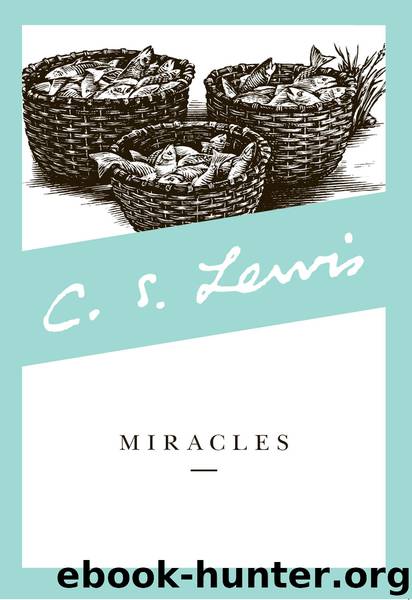Miracles by C S Lewis

Author:C S Lewis [Lewis, C S]
Language: eng
Format: epub
Tags: Cristão, Devocional
ISBN: 9780006280941
Google: tH8di3qQDhEC
Amazon: 1470812363
Barnesnoble: 1470812363
Goodreads: 30636
Publisher: HarperCollins
Published: 1947-01-01T05:00:00+00:00
12
THE PROPRIETY OF MIRACLES
The Principle at the same moment that it explains the Rules supersedes them.
seeley, Ecce Homo, chap. xvi.
If the ultimate Fact is not an abstraction but the living God, opaque by the very fullness of His blinding actuality, then He might do things. He might work miracles. But would He? Many people of sincere piety feel that He would not. They think it unworthy of Him. It is petty and capricious tyrants who break their own laws: good and wise kings obey them. Only an incompetent workman will produce work which needs to be interfered with. And people who think in this way are not satisfied by the assurance given them in Chapter VIII that miracles do not, in fact, break the laws of Nature. That may be undeniable. But it will still be felt (and justly) that miracles interrupt the orderly march of events, the steady development of Nature according to her own inherent genius or character. That regular march seems to such critics as I have in mind more impressive than any miracle. Looking up (like Lucifer in Meredith’s sonnet) at the night sky, they feel it almost impious to suppose that God should sometimes unsay what He has once said with such magnificence. This feeling springs from deep and noble sources in the mind and must always be treated with respect. Yet it is, I believe, founded on an error.
When schoolboys begin to be taught to make Latin verses at school they are very properly forbidden to have what is technically called ‘a spondee in the fifth foot’. It is a good rule for boys because the normal hexameter does not have a spondee there: if boys were allowed to use this abnormal form they would be constantly doing it for convenience and might never get the typical music of the hexameter into their heads at all. But when the boys come to read Virgil they find that Virgil does the very thing they have been forbidden to do—not very often, but not so very rarely either. In the same way, young people who have just learned how to write English rhyming verse, may be shocked at finding ‘bad’ rhymes (i.e. half-rhymes) in the great poets. Even in carpentry or car-driving or surgery there are, I expect, ‘licenses’—abnormal ways of doing things—which the master will use himself both safely and judiciously but which he would think it unwise to teach his pupils.
Now one often finds that the beginner, who has just mastered the strict formal rules, is over-punctilious and pedantic about them. And the mere critic, who is never going to begin himself, may be more pedantic still. The classical critics were shocked at the ‘irregularity’ or ‘licenses’ of Shakespeare. A stupid schoolboy might think that the abnormal hexameters in Virgil, or the half-rhymes in English poets, were due to incompetence. In reality, of course, every one of them is there for a purpose and breaks the superficial regularity of the metre in obedience to
Download
This site does not store any files on its server. We only index and link to content provided by other sites. Please contact the content providers to delete copyright contents if any and email us, we'll remove relevant links or contents immediately.
More Language of Letting Go: 366 New Daily Meditations by Melody Beattie(2437)
The Holy Spirit by Billy Graham(2408)
To Light a Sacred Flame by Silver RavenWolf(2351)
The Secret Power of Speaking God's Word by Joyce Meyer(2248)
Tuesdays With Morrie by Mitch Albom(2166)
The Lost Art of Good Conversation by Sakyong Mipham(2124)
The Traveler's Gift by Andy Andrews(2008)
Kundalini by Gopi Krishna(1822)
A Kingsbury Collection by Karen Kingsbury(1716)
Finding Chika by Mitch Albom(1646)
Angels of God: The Bible, the Church and the Heavenly Hosts by Mike Aquilina(1626)
As a Man Thinketh by James Allen(1580)
Angels by Billy Graham(1548)
The Yoga of Jesus: Understanding the Hidden Teachings of the Gospels by Paramahansa Yogananda(1522)
Curse Tablets and Binding Spells from the Ancient World by Gager John G.;(1509)
Barking to the Choir by Gregory Boyle(1503)
Autobiography of a Yogi (Complete Edition) by Yogananda Paramahansa(1485)
How To Be Born Again by Billy Graham(1402)
Anxious for Nothing by Max Lucado(1396)
